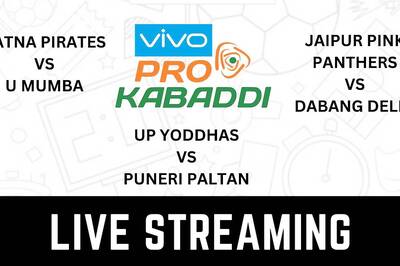
views
The Balakot air strike has rendered the BJP's strategy for the 2019 Lok Sabha elections more Modi-centric than ever. Prime Minister Narendra Modi is the ‘Vikas Purush’ (development man), the ‘Bahubali’ (strong man) and Bharat brand ambassador all rolled into one, with the supporting cast of party leaders reduced to bit players.
The relative efficacy of the post-Pulwama push factor in different states is a subject of much discussion in BJP circles. It is generally accepted that it will be central to the party's campaign, but is likely to have more impact in the north than in the south.
The question is whether the surge of nationalism can subsume sub-nationalisms. The sense of insecurity vis-à-vis Pakistan may be a pan-Indian phenomenon, going by an electoral experiment in Telangana. According to party sources, a survey conducted by a Sangh affiliate immediately after the Pulwama attack but before the air strike found a 3.5% overnight swing in favour of the BJP.
Shortly thereafter, Chief Minister K Chandrashekar Rao announced an award of Rs 25 lakh each for the families of the 40 CRPF soldiers killed in Pulwama. The beneficiaries were not confined to his state alone and the CM explained the large-hearted move by saying that the “entire nation” stood by the soldiers. Andhra Pradesh, too, did the same.
From these displays of nationalist sentiment, those involved in the BJP campaign have deduced that Modi-the-strongman may play well even in the southern states. There's no consensus on this point, the conventional view being that in the south, the party should go with Vikas Purush and the performance-populism-stability formula. Likewise, differential treatment may be required in the north-east, West Bengal and the tribal states of Chhattisgarh and Jharkhand.
In West Bengal, the narrative may willy-nilly become one of 'Bharat vs Bangladesh', in an effort to polarise the electorate on illegal immigration. Here, it is not in the BJP's interests to pit Modi against 'Didi', as Chief Minister Mamata Banerjee is known. Given her iconic status, the 'Bharat' abstraction will work better.
It may not work in the northeast, where the BJP could be in trouble, thanks to the now-lapsed Citizenship Bill. The perspectives of the local BJP units and the central leadership on the Bill have been diametric. After supporting the passage of the Bill in the Lok Sabha, the local leadership had suggested that it be shelved, in view of the strong backlash from northeast organisations. Instead, it was brought to the Rajya Sabha.
In Tamil Nadu, where the DMK-Congress has the overwhelming advantage, the AIADMK-BJP's hope lies in turning the campaign into a presidential-style contest between PM Modi and Congress president Rahul Gandhi. DMK chief MK Stalin's declaration of Gandhi as the PM nominee lends itself to precisely the kind of compare-and-contrast campaign the BJP would like.
In central, west and north India, home to the majority of the slain CRPF soldiers, the nationalism card will be played to the hilt. Modi will seek to recapture the 'us against them' spirit of demonetisation, which worked for the BJP in the UP assembly elections; the difference being that the black money fat cats have been replaced by alleged Pakistan supporters. The surprise endorsement of the PM by Samajwadi Party patriarch Mulayam Singh Yadav has buoyed party workers.
The one state where the BJP acknowledges the PM has been completely outdone in the strongman stakes is Punjab. CM Captain Amarinder Singh has walked away with the nationalist laurels, to the discomfiture of his political rivals, including his fellow Congressman and chief bugbear, Navjot Singh Sidhu.
Maintaining the momentum of the post-Pulwama push factor is a challenge for the BJP. The opposition, by repeatedly questioning the veracity of the Balakot strike, has certainly helped in keeping it top-of-the-mind. It may have done better to limit the BJP's Pulwama advantage by diverting the public discourse to unemployment, the farm sector and other issues of public resonance, but has now gone too far along that path to pull back and can only hope its message trickles down to the masses.
An unintended consequence of Modi-centricism has been the bonsai effect on the top rung of the BJP. The gap between the party No.1 and No.2 and the rest of the line-up has widened over the last five years and has become even more pronounced post-Pulwama. Modi is not just the chief campaigner, he is the whole act.
(Author is a senior journalist. Views are personal)




















Comments
0 comment